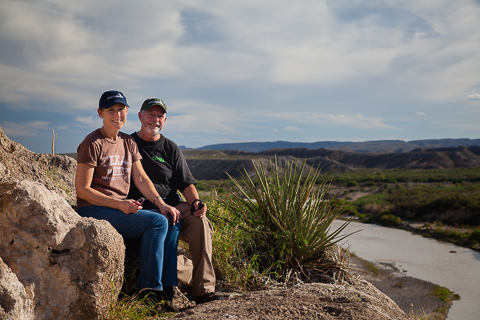
White Sands National
Monument &
Big Bend National Park
(click your browser's "back" button to return
to original location
or click here to go to David Boston
Photography)

Patty
& Dave at Boquillas Canyon, Big Bend National Park
photo by Andrew Lerman
|
View
the slideshow by clicking White Sands National Monument When
finished, click your browser's
View
the slideshow by clicking When
finished, click your browser's
When
finished, click your browser's
|
White Sands National Monument. In October, 2015, I drove out to Alamogordo, NM to spend a few days photographing at White Sands National Monument with my good friend Andy L. I first met Andy on the Katmai trip and met up with him again on the Smoky Mountains trip. White Sands National Monument is a U.S. National Monument located about 16 miles (26 km) southwest of Alamogordo, NM. Located in the mountain-ringed Tularosa Basin (within the Chihuahuan Desert) this national monument comprises the southern part of a 275 square miles (710 km2) field of white sand dunes composed of gypsum crystals. It is the largest gypsum dune field in the world. Andy and I planned to do most of our photography early in the morning and late in the evenings to take advantage of pleasant and potentially dramatic light that occurs around sunrise and sunset. Hiking as much as 4 miles at time, we spent the remainder of our days scouting out potential locations and marking them with my hiking GPS so that we could return to them (sometimes in the dark before sunrise) when the lighting was better. Moving several dunes deep to try to minimize the impact of dune hikers' footprints, one could easily become disoriented and lost and the GPS was an invaluable tool to find our way back once we were done shooting. The planning and scouting paid off, as we came away with several satisfying images, all shot during the "golden hours" (the hours before and after sunrise and sunset). Big Bend National Park. After we were done at White Sands, Andy and I drove to Texas to do some photography at Big Bend National Park. On the way, we stopped in Alpine, TX to pick up Patty. She had taken the train from home to Alpine to join us as we explored Big Bend. None of us had ever been to Big Bend, and we didn't really know what to expect. We were very pleasantly surprised and found it hard at times to believe we were in Texas. Big Bend National Park has
national significance as the largest protected area of Chihuahuan Desert
topography and ecology in the United States. It
contains more than 1,200 species of plants, more than 450 species of birds, 56
species of reptiles, and 75 species of mammals.
Located completely in the largest county in Texas (Brewster County) Big
Bend is one of the largest, most remote, and least-visited national parks in the
lower 48 United States. In recent
years, only 300,000–350,000 visitors have entered the park annually.
The topography of the park ranges from desert to canyons and mountains
(some exceeding 7,000 feet in elevation). Big Bend is a place that all three of us want to return to in the future ... it's that diverse and interesting. The Big Bend photo collection includes photos by both Patty and me and one of the two of us by Andy. Alameda Park Zoo. As mentioned above, Andy and I did all our shooting at White Sands during the the "golden hours" (the hours before and after sunrise and sunset). We spent one afternoon touring the Alameda Park Zoo in Alamogordo. This zoo is the oldest zoo in the southwest United States, and the smallest zoo to be Association of Zoo & Aquarium (AZA) Accredited. The zoo has more than 12 acres and over 250 exotic and indigenous animals, many of which are "rescue animals". Photography at the zoo is challenging as most of the animals are in cages with very tight spacing between the cage wires (bars) and, since it is heavily shaded, the light is very dim. Despite the challenges, I was able to get a few images, which are shared here. Photo info. Click the slideshow icons at left to see the photos from the trip. The following equipment was used:
All images were shot Raw (5DMKII & 7DMKII) or JPG (Patty's camera and my pocket camera)) and processed in Adobe® Photoshop® Lightroom® CC with occasional touch up in Adobe® Photoshop® CC. Additional photo data is provided below each photo in the slideshow. Enjoy the photos! All photos are Copyright © 2015 David W. Boston, Patty Boston, or Andrew Lerman (see more here) |